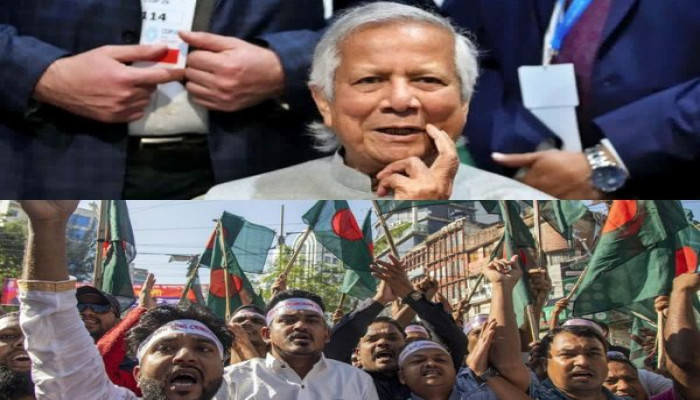Yunus sets deadline for Bangladesh elections amid political pressure and international scrutiny
- In Reports
- 06:12 PM, May 30, 2025
- Myind Staff
Bangladesh's top adviser Muhammad Yunus promised that the country's polls would be conducted between December 2025 and June 2026. Political parties continued putting pressure on him to declare a specific date.
Bangladesh planned new elections after former Prime Minister Sheikh Hasina was ousted last year amid a country-wide protest. Yunus became the chief of the interim administration on 8 August 2024.
India previously called upon Bangladesh to conduct free, fair, and inclusive elections soon. India also expressed concerns over the prohibition on Sheikh Hasina's Awami League.
Yunus acknowledged the calls for parliamentary elections. He stated that the elections may take place by June next year. During his visit to Japan, he announced that the national elections would be held "any time between December and June next year."
Chief Adviser’s Press Secretary Shafiqul Alam told Dhaka Tribune, "Prof Yunus told Taro Aso that the election will be held between December and June. He has set a six-month time frame and the election will be conducted within that period."
Last week, the Election Commission of Bangladesh issued a directive. It prohibited Awami League and its affiliated groups from political activities such as rallies and conferences. This restriction will continue until Bangladesh's International Crimes Tribunal completes its proceedings.
Sheikh Hasina established the tribunal in 2009 to investigate crimes committed by the Pakistani army during Bangladesh’s 1971 independence war.
Senior Secretary of the Election Commission, Aktar Ahmed, informed journalists, "We have suspended Bangladesh Awami League registration [as a political party] in line with the home ministry notification."
The Awami League opposed the move. The party referred to it as a decision of the "fascist dictator Yunus government." In a statement, it said, "...we express firm commitment that the Bangladesh Awami League will continue to conduct its activities properly, ignoring this decision of the fascist Yunus government."
During the political unrest, India’s Ministry of External Affairs (MEA) on May 29 responded to Muhammad Yunus’ allegations. He claimed that “Indian media delegitimises transitional leadership.”
Yunus alleged that both internal and external forces, including India, were attempting to destabilise Bangladesh. He said these efforts had created a “war-like situation.”
MEA spokesperson Randhir Jaiswal dismissed the claim. He responded, “When statements of this sort come, it seems like you want to deflect in another direction from your own challenges related to governance there — and to blame others by saying that these extraneous issues caused by others are the reason for these problems — does not solve the issue.”
The MEA spokesperson called on Bangladesh to conduct elections that are free, fair, and inclusive. He said this would allow the people to express their will.
Jaiswal said, “On Bangladesh, we have articulated our position very clearly, as far as elections in Bangladesh are concerned, and we have done so consistently. Bangladesh needs to ascertain the will and mandate of the people by holding an inclusive, fair and free election at an early date.” The Ministry of External Affairs also described the Awami League ban as “concerning.”
On May 13, MEA spokesperson Randhir Jaiswal stated, “The ban on the Awami League without due process is a concerning development.” He added, “As a democracy, India is naturally concerned about the curtailment of democratic freedoms and shrinking political space. We strongly support the early holding of free, fair and inclusive elections in Bangladesh.”
In the meantime, the head of a new political party said that the interim administration had not fully ensured public safety. He believed it would be difficult to conduct a general election this year.
Nahid Islam, leader of the Jatiya Nagorik Party (National Citizens’ Party or NCP) and former student leader, said, “In the past seven months, we all expected the policing system, law and order to be restored through short-term reforms. It has happened to an extent, but not up to our expectations.”
He said, “In the current law and order situation and policing system, I don't think it is possible to hold a national election.” He expressed this view during his first interview as the NCP leader in Dhaka.
The National Citizens’ Party said elections must take place only after reforms. According to the Daily Star, NCP Chief Coordinator Nasiruddin Patwari said that it was possible to implement electoral reforms and hold elections within the timeframe set by Yunus.
The Bangladesh Nationalist Party (BNP), led by former Prime Minister Khaleda Zia, demanded that elections be held by December. The party said it would be “difficult” to continue supporting Yunus’ government without a firm election plan.
According to Dhaka Tribune, BNP chairperson Begum Khaleda Zia expressed hope that democracy would soon be restored in Bangladesh. Zia returned from London in early May after four months of medical treatment. Her return increased pressure on the interim leadership to hold elections.
Since 1991, Zia and Hasina have alternated as prime ministers of Bangladesh. The country returned to democracy after the ouster of authoritarian President H.M. Ershad that year.
Recently, rumours surfaced that Yunus was considering stepping down. Some claimed he was troubled by the political parties’ failure to reach common ground.
Planning Ministry acting head Wahiduddin Mahmud rejected the rumours. According to Al Jazeera, he told journalists, “The chief adviser [Yunus] is staying with us – he hasn’t said he’ll resign – and the other advisers are also staying; we are here to carry out the responsibilities given to us.”







Comments